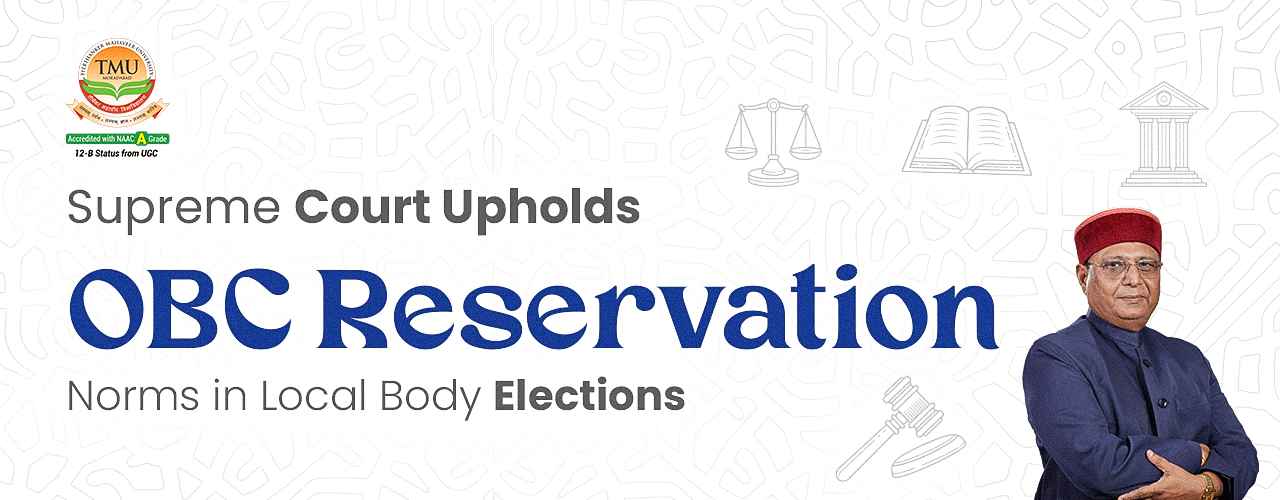Supreme Court's Directive: Ensure No Discrimination in OBC Reservation
Table of Contents
The Supreme Court has stayed the Allahabad High Court order that instructed local body elections in Uttar Pradesh to be conducted without reservations for the Other Backwards Classes (OBCs). With local body elections due to conclude by the end of January, the announcement had triggered immediate legal challenges.
Background: The OBC Reservation Dispute
The core issue stemmed from the claim that the Uttar Pradesh government failed to follow the Supreme Court-mandated ‘Triple Test Formula’ while determining OBC reservation in municipal elections. Although the state government argued that the process was followed correctly, the High Court was not convinced by the government's submission and ordered elections without OBC quotas.
Teerthanker Mahaveer University
Apply for Admission
Click Here To Apply for Admission
Constitutional Provision and the Legal Challenge
As per Article 243-T of the Indian Constitution, reservation of seats for Scheduled Castes (SCs), Scheduled Tribes (STs), and OBCs in local self-governments is permitted. However, it requires compliance with constitutional principles such as social and administrative fairness.
Unlike SCs and STs, whose population is officially counted in the Census, OBC enumeration is often missing. State governments typically rely on Rapid Surveys—ad hoc studies often lacking official rigour—which have frequently been questioned for their credibility.
What Is the 'Triple Test Formula'?
The Supreme Court’s landmark 2010 judgment in the Krishna Murari vs. State of Maharashtra case laid the foundation for the Triple Test Formula. The court ruled that OBC reservations in local bodies must satisfy three criteria:
1. Constitution of a Dedicated Backwards Classes Commission
Each state must establish a commission to conduct an in-depth, empirical survey of the social, economic, and political status of OBCs in local bodies.
2. Recommendations Based on Survey
The Commission's recommendations must then determine whether a reservation for OBCs is necessary and, if so, to what extent.
3. Reservation Limits
The total number of reserved seats for SCs, STs, and OBCs must not exceed 50% of the total seats in any local body.
Political Ramifications and Judicial Review
While these directions aim to ensure fair representation, political implementation often deviates from the legal framework. In Uttar Pradesh, successive governments, irrespective of political alignment, have resorted to OBC reservations based on rapid surveys rather than comprehensive commissions. Similar lapses have been observed in other states like Maharashtra, Madhya Pradesh, and Jharkhand, leading to judicial scrutiny.
Despite Supreme Court warnings and guidelines, proper implementation remains elusive. The recent intervention in the Allahabad High Court’s order by the apex court reiterates the importance of adhering strictly to the Triple Test framework.
Local Elections: A Crucible of Democracy
Panchayat and local body elections are the first step in the democratic process for many political aspirants. Ensuring fair representation for all communities, including the OBCs, is vital for nurturing inclusive governance at the grassroots level.
Conclusion: Upholding Fair Representation
The Supreme Court's latest stay reflects its commitment to upholding constitutional mandates and ensuring no community is unfairly excluded. It reinforces that reservations must be legally and empirically justified, not politically expedient. For genuine inclusive development, governments across states must implement the Triple Test Formula with sincerity and transparency.















